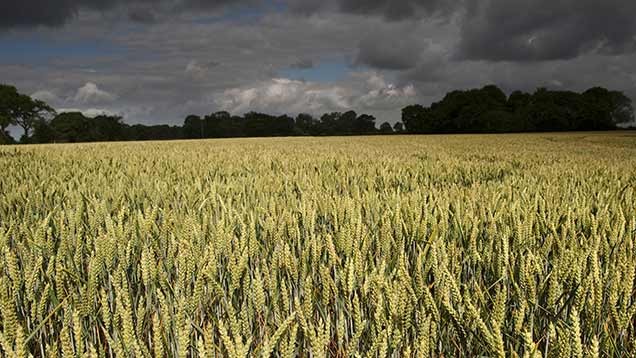Farmers ‘cannot ignore threat of climate change’
 (c) Rex
(c) Rex Scientists have warned farmers can no longer ignore the effects of climate change and farming practices must be adapted for a warmer world.
According to the Met Office, 2014 was the warmest year since records began in 1910, continuing a strong trend in recent years. Eight of the UK’s top 10 warmest years have happened since 2002.
Extreme weather, such as floods and the storms seen in Scotland this week, is predicted to become more common in the UK.
“Clearly the alteration in our climate will have a profound effect on our agricultural landscape.”
Tim Daniell, James Hutton Institute
In particular, rainfall patterns are predicted to change, with drier conditions in southern parts of the UK, causing issues with water supply for crop growth, while in Scotland rainfall is expected to become concentrated into short, heavy bursts.
See also: Global warming threat to wheat yields
Soil ecologist Tim Daniell, of the James Hutton Institute in Scotland, said British farmers are among the most productive in the world and our warm, mild and wet climate has been well suited to world-beating yields.
But as the climate changes, the research and development capability that supports it must be adapted to “anticipate new circumstances and adapt resources and practices accordingly”.
Dr Daniell said studies suggested there might be an opportunity to increase cropped land area, especially in Scotland, and increase the diversity of crops that can be grown.
“Clearly the alteration in our climate will have a profound effect on our agricultural landscape and the institute – along with others – is directly involved in increasing both our understanding of the effects of climate change and how agronomy can adapt to the challenges that lie ahead.
“Whatever the future climate picture, the key is for society to be ready to adapt to new circumstances by planning crop breeding, agronomy and agricultural practices around a range of potential scenarios.”
Whichever way the situation evolves, making these transitions sustainably is the only way to ensure continuing food security and ongoing viability in farming, he added.
Ken Loades, a soil physicist at the Hutton Institute, said increased rainfall intensity would lead to greater levels of soil erosion, especially on sloping ground.
“These effects may be minimised by altering land management to increase infiltration and reduce run off,” he added.
“This would have the additional advantages of maintaining groundwater levels, providing irrigation water during dry periods and reducing flood risk.”
“New threats previously associated with southern climates may become more prevalent, however the threat from other diseases may reduce.”
Adrian Newton, James Hutton Institute
Adrian Newton, a senior cereal pathologist at the James Hutton Institute, said changing climate would inevitably lead to alteration in the key pathogens that farmers have to manage.
“New threats previously associated with southern climates may become more prevalent, however the threat from other diseases may reduce,” he added. “This will be driven by both temperature and rainfall changes.”
He said changes in the mosaic of crops across the landscape might also present additional threats from pests and diseases, which can be hosted on more than one plant species.
The effects of climate change, such as combinations of temperature carbon dioxide and water availability, need to be explored together as each has typically been studied in isolation, he added.
